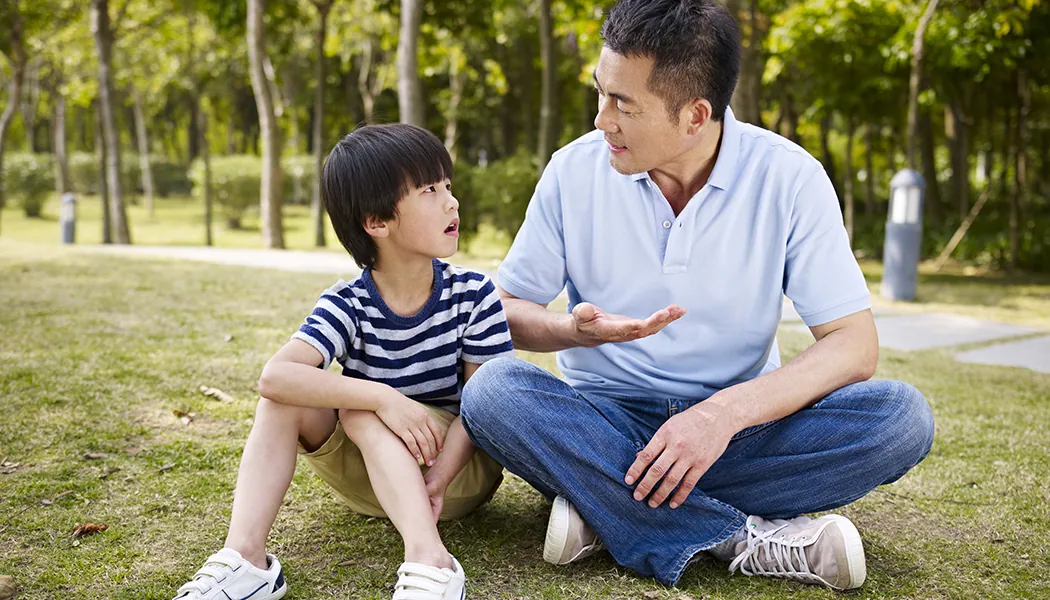Talking With Your Child About Cancer

Many parents say that when they are first diagnosed with cancer, they are concerned about how the disease and treatment will affect their family. Among these concerns is the burning question: What is the best way to tell a child about the diagnosis?
Based on feedback from parents who have faced cancer, it is extremely normal to be unsure of the best way to tell a child or even when to tell them. There is a constant tug-of-war between the desire to be honest and open versus concern about how the child will cope with the news. The truth is, there is no correct way to approach this situation. Every family is different, and each child will react differently. Luckily, there are a few ways to approach this difficult situation, no matter what the situation may be.
When to Tell Your Child About Cancer
Sometimes parents need to cope with the news themselves before having a conversation with their children. It is perfectly fine to wait until the parents are ready to talk, but they should be mindful that children are intuitive. Children will likely realize that something is not right, and this realization may cause them to imagine the worst. Similarly, if a child accidentally finds out from overhearing a conversation, the narrative is no longer under control. Having the opportunity to prepare for the conversation instead of being caught off guard will make the conversation easier for everyone involved.
How to Prepare for the Conversation
The conversation will seem daunting until it’s over. It is tough to predict how someone will react to the news. The goal should be to inform the child and offer them support where needed. As such, it is essential to prepare by thinking about the messages that should be conveyed. It is important to take the age of the child into consideration. Preschool children do not need a lot of details about how the disease or treatment works. Children of this age are more concrete and will understand better if the conversation focuses on the things they can see. Things such as hair loss, the location of cancer, and ensuring the child that cancer is not contagious will help them understand the message. The older the child is, the more information they will be able to comprehend.
While preparing how to approach the conversation, parents should also prepare for what questions the children may ask. One of the most difficult questions to answer is whether the parent will survive the disease. Some parents may be able to inform their children that everything will be alright confidently. Others may struggle with how to have this conversation. Some of the best advice given by other parents is to share positive information where possible. The child may know that some people die from cancer, but remind them that there are plenty of survivors. It can also be helpful to let them know if the cancer was caught early or what type of treatment is being used.
Showing Support
Once the conversation is over, it is important that children are reminded that they are welcome to ask more questions at any time. It can be beneficial to engage the child in the fight against cancer by fundraising, taking part in awareness days, or keeping up to date with recent findings. The National Foundation for Cancer Research understands that involving children in the fight against cancer can help them regain a sense of control. As such, NFCR has launched several programs that allow children to use their own passion to fundraise or raise awareness for cancer research.
Play4TheCure is a sports fundraising program that provides funding to the best cancer researchers in the world. Play4TheCure inspires young athletes and their teams to leverage their passion for sports to “Play4” loved ones affected by cancer and encourages them to actively participate in working to fund cancer research to make a difference. Similarly, Arts4TheCure encourages children to use their fine arts or performing arts skills to raise funds to advance cancer research. NFCR has also launched a Young Ambassador Program, enabling top high school students to serve as leaders in raising awareness and support for cutting-edge cancer research.
Sign-up to Stay Informed About Cancer Research Breakthroughs with NFCR!
A world without cancer is possible. Help us turn lab breakthroughs into life-saving realities.

5.7 Million+
Donors who have fueled NFCR’s mission

$420 Million+
Invested in high-impact research & programs

36+ Labs & Hundreds of
Nobel Laureates & Key Scientists received NFCR funding, driving breakthrough research












